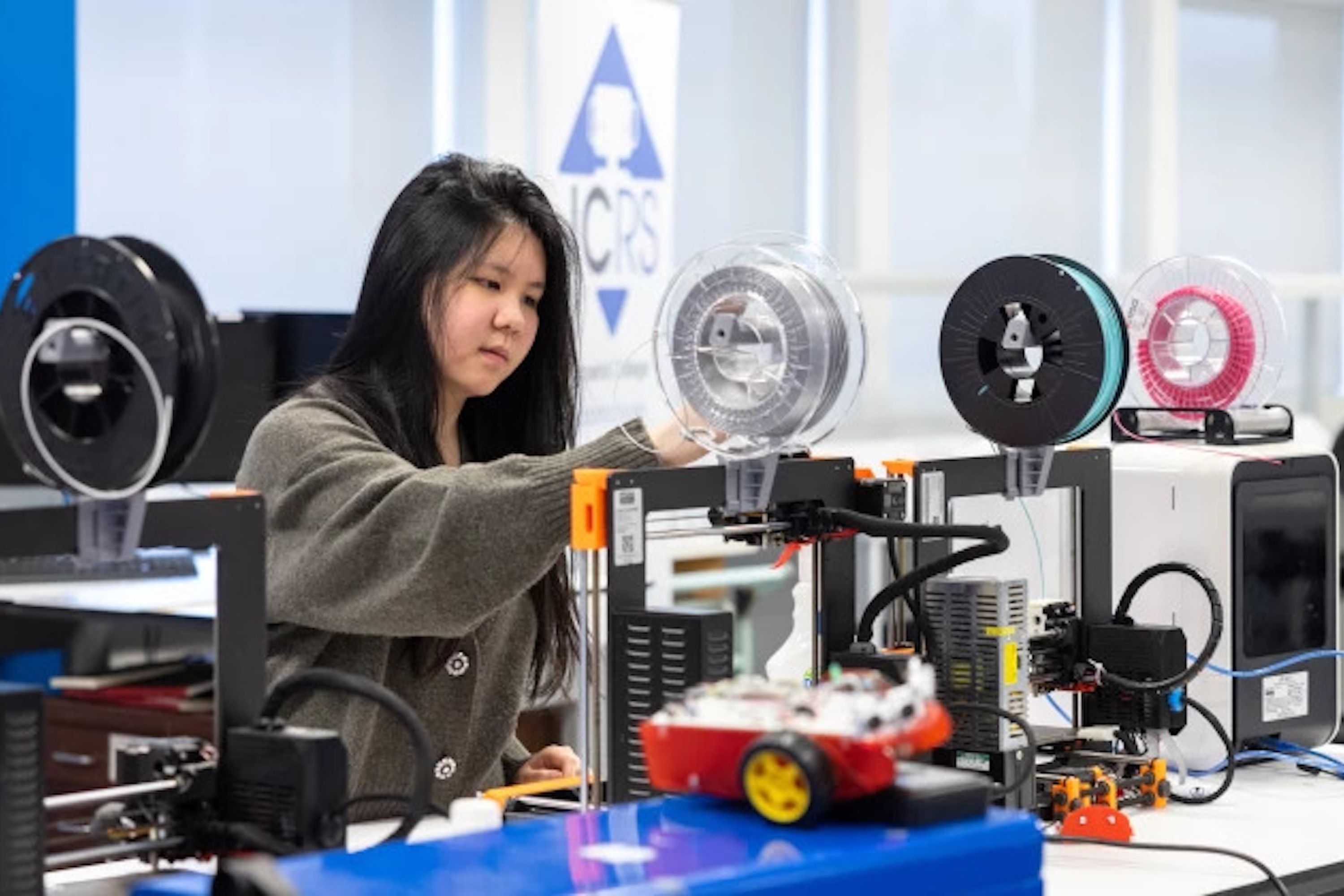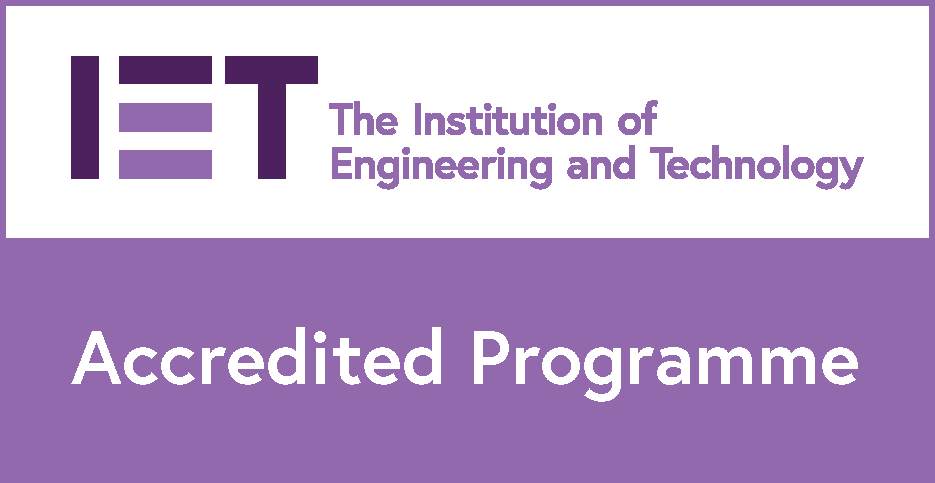
Electronic and Information Engineering
Combine the advanced technical knowledge and practical skills of both electronic engineering and computing in this integrated Master’s degree.
Design your own degree programme to fit your developing skills and interests, from a broad range of specialist modules
Benefit from a teaching programme inspired by our internationally-leading research
Get practical experience in the field with a six-month placement, or create innovative solutions to a client-proposed consultancy challenge
Course key facts
Qualification
MEng
Duration
4 years
Start date
October 2025
UCAS course code
GH56
Study mode
Full-time
-
Fees
£9,535 per year Home
£43,300 per year Overseas
Delivered by
Location
-
South Kensington
-
Applications: places
7 : 1 (2023)
Minimum entry standard
A*A*A or A*AAA (A-level)
40 points (International Baccalaureate)
Course overview
Electronic and information engineers are at the forefront of the challenges to connect our world, to design more efficient and affordable technology, and to help us live healthily and sustainably.
This unique course combines electronics with computer science and information engineering, with specialist modules from the Department of Computing, and projects and coursework drawn from our latest research, focused on inspiring and supporting tomorrow’s industry-ready, creative engineers.
A common first year lets you explore the breadth of the subject. Labs and problem-solving classes will equip you with a solid theoretical base and practical hardware and software skills.
Year two follows a core programme, completing the fundamentals in analogue and digital electronics, communications and control, alongside a strong focus on mathematics and computing, networks and high-level programming. You’ll learn to program in C++ and become familiar with software design, programming concepts and tool use – skills that are transferable to any programming language and environment.
In third year, you’ll select from a number of focused modules, so you can choose to take a wide-ranging programme of study, or concentrate your expertise in a particular field.
You’ll also have the option to take a six-month industrial placement and experience engineering in action, or to be part of a team acting as consultants on a design challenge proposed by an industrial client.
The final year offers an extensive range of advanced specialist modules inspired by the very latest research.
You’ll apply your knowledge and skills to increasingly ambitious project work throughout the course, ultimately showcasing your imagination, originality and independent engineering expertise in a substantial final year project.
For an extra international perspective, students can choose to spend their fourth year at one of our partner universities overseas.
Structure
This page is updated regularly to reflect the latest version of the curriculum. However, this information is subject to change.
Find out more about potential course changes.
Please note: it may not always be possible to take specific combinations of modules due to timetabling conflicts. For confirmation, please check with the relevant department.
You’ll study the following core modules.
Core modules
Understand why mathematics is the foundation of all engineering practice. Build the robust mathematics skills needed to proceed to more complex modules. Appreciate mathematical principles in an engineering context.
Familiarise yourself with the interdisciplinary nature of electrical engineering and analyse the generation, transport and management of electrical power systems.
Become familiar with programming using C++ and learn standard imperative programming skills such as control-flow, variables, and data structures.
Build a foundation in the analysis and design of electronic circuits, and explore key concepts that are essential for higher level study of electronics.
Develop your understanding of digital design and low-level computer operation to understand system design across the hardware - software boundary.
Apply your knowledge to a major group design project which considers the full design process, from the client brief to the demonstration of a prototype.
Professional accreditation
Accredited by the Institution of Engineering and Technology (IET) on behalf of the Engineering Council for the purposes of fully meeting the academic requirement for registration as a Chartered Engineer.
With a professionally accredited degree, you’ll be able to demonstrate to employers that you have achieved an industry-recognised standard of competency. Professional accreditation also provides international recognition of your qualifications, which you can use to launch a career abroad.
Becoming a Chartered Engineer can further enhance your career prospects and earning potential. It demonstrates your competencies and commitment to lifelong learning – providing you with recognition in your field and greater influence and opportunities.
Our accreditation agreement with IET is renewed every five years. The current accreditation agreement is due to be renewed for students starting their studies in the 2029-30 academic year.
Associateship
In addition to your degree, you’ll receive the Associateship of the City and Guilds of London Institute (ACGI) upon completion of this course. This associateship is awarded by one of our historic constituent Colleges.
Teaching and assessment
Teaching and learning methods
-
Lectures
-
Design and build projects
-
Flipped classroom
-
Group projects
-
Laboratory work (software, hardware and embedded systems)
-
Individual projects
-
Industrial placement
-
Problem-solving classes
-
Software laboratory
-
Workshops
-
Video recordings
-
Tutorials
-
Virtual learning environment
Balance of assessment
Key
- Written tests (online)
- Practical (lab)
- Examinations
Years 1 and 2
- 20% Written tests (online)
- 30% Practical (lab)
- 50% Examinations
Assessment methods
-
Coursework
-
Oral presentations
-
Poster presentations
-
Reports
-
Written examinations
Testimonials
Entry requirements
We consider all applicants on an individual basis, welcoming students from all over the world.
Minimum entry standard
A*A*A or A*AAA
To include:
- A* in Mathematics
- A*/A in Physics (A* is required if applying with three A-levels. At least an A is required if applying with four A-levels)
- A in a third and/or fourth subject
Recommended subjects:
- Further Mathematics (strongly encouraged but not essential)
- Chemistry
- Computer Science /Computing
- Design and Technology
- Electronics
Not accepted: General Studies and Critical Thinking
Science Practical Endorsement: If you are made an offer you will be required to achieve a pass in the practical endorsement in all science subjects that form part of the offer.
Typical offer
A*AA-A*A*A (applicants studying three A-levels)
A*AAA (applicants studying four A-levels)
Made to at least 80% of 2023 A-level applicants.
Support for widening participation applicants
Our contextual admissions route for UK applicants may entitle you to additional considerations within the application process to help us form a more complete picture of your potential to succeed at Imperial.
Find out more about who is eligible and what support you may receive.
How to apply
Applications are closed for 2025 entry
Applications are closed for 2025 entry.
Admissions test (ESAT)
To be eligible for selection for this course for 2025 entry, you must sit the Engineering and Science Admissions Test (ESAT) as part of the application process.
Registration for the January 2025 test sitting is now closed. You can find more information about what to expect on your test day, including materials to help you prepare for the test, on the University Admissions Tests UK website.
About ESAT
- Computer-based, multiple-choice test which you must sit in a Pearson VUE test centre.
- Create a UAT-UK account with Pearson VUE to book a test.
For this course, you need to book and sit the following three ESAT modules:
- Module 1 – Mathematics 1
- Module 2 – Mathematics 2
- Module 3 – Physics
Key test deadlines
October sitting (15 and 16 October 2024): Registration is now closed
January sitting (7 and 8 January 2025): Registration is now closed
Take the test just once as only your first score will count.
Test fee bursary
UK candidates in financial need can apply for a bursary voucher to book the ESAT free of charge.
Full details of eligibility criteria and how to apply are available on the UAT-UK website.
Access arrangements
Note: The deadline has now passed to apply for access arrangements for January 2025.
Access arrangements, for example, extra time or rest breaks, are available for students with learning difficulties, disabilities, and other medical conditions.
If this applies to you, you need to notify UAT-UK of your requirements before booking your test in one of Pearson VUE’s global network of test centres.
Once your access arrangements have been confirmed, you will be able to book your test online.
Admissions Tutors consider all the evidence available during our rigorous selection process and the College flags key information providing assessors with a more complete picture of the educational and social circumstances relevant to the applicant. Some applicants may be set lower offers and some more challenging ones.
We encourage applications from all who want to learn what it takes to create our future. You should have the potential to succeed in a challenging course, as demonstrated by meeting our entry grades. But we are looking beyond your raw marks for a passion in developing your knowledge and understanding of this broadest form of engineering.
In addition to your academic ability, we will look at your personal statement and reference to understand your personal motivation, your commitment to your chosen area of study, and your broader interests.
If your UCAS application indicates that you are likely to satisfy our requirements, your personal statement shows a clear interest in the subject, and you perform well in the admissions test, you may be invited for an online interview.
The interview will be 25-30 minutes with a member of academic staff. We aim for the interview to be more of a conversation. You will be asked questions to understand your thought process and to see how you solve problems. The interviewer will also ask you about your motivation for the course.
It may take a very long time for you to hear anything from us. This is because we accept applications right until the end of January, we read and assess applications very carefully, and we continue making decisions right up to the end of March. Even if you have applied in October, you may not hear anything until March. Please bear with us.
An ATAS certificate is not required for students applying for this course.
Electrical and Electronic Engineering students and Electronic and Information Engineering students share a common first year. This gives you a solid theoretical base and lets you understand and explore the two subjects before making your choice.
At the end of your first year, you choose whether to study on the Electrical and Electronic Engineering stream, or the Electronic and Information Engineering stream. The approval of such transfer is based on your performance on the related modules of the stream that you want to transfer to.
Transfer to Electronic and Information Engineering
- You must have performed well in both Digital and Computer Architecture and Programming for Engineers.
Transfer to Electrical and Electronic Engineering
- You must have performed well in both Analysis and Design of Circuits and Topics in Electrical Engineering.
Within the Electrical and Electronic Engineering degree, you have further options for your studies:
- You can decide whether to study the BEng (3 years) or the MEng (4 years) at the end of your second year.
- You can transfer from to the MEng with a Year Abroad during your third year. The placements are competitive and the final selection is made following an interview. You must normally be achieving marks of 65% and above at the time of selection to be eligible for the Year Abroad course.
There is no benefit in applying to more than one course in this Department, but if you do we will contact you for your decision before continuing the process of your application.
If you are an international student, transferring to a different course could have an impact on your student visa.
Please visit our International Student Support webpage for further information.
Year abroad
Language requirement
Teaching is in the language of your host country in France and Germany, so you will need to reach an acceptable proficiency in the relevant language before you go. Free language classes are available at the College to help you prepare.
Availability
There are limited places available on the Year Abroad programme, which means that competition for selection is strong and a placement cannot be guaranteed.
Normally, only students with marks of 60% or above will be eligible for placements in France and Germany. Only students with marks of 70% or above will be eligible for placements in the USA.
Please note the list of universities located abroad that the Department currently has partnerships with is illustrative.
Partnerships with universities are subject to continuous review and individual partnerships may or may not be renewed.
Fees and funding
Home fee
2025 entry
£9,535 per year
Year abroad
2025 entry
£1,450 for that year
Important update for 2025 entry
The UK government has announced that, starting in April 2025, maximum tuition fees for Home undergraduate students in England will increase from £9,250 per year to £9,535. Find out more.
Your fee is based on the year you enter the university, not your year of study. This means that if you repeat a year or resume your studies after an interruption, your fees will only increase by the amount linked to inflation.
Find out more about our , including how inflationary increases are applied to your tuition fees in subsequent years of study.
Whether you pay the Home or Overseas fee depends on your fee status. This is assessed based on UK Government legislation and includes things like where you live and your nationality or residency status. Find out .
If you're a Home student, you can apply for a from the UK government to cover the entire cost of tuition for every year of your course.
The loan is paid directly to the university.
You will start repaying it only after you leave your course, have a job, and are earning above a certain amount.
Once the repayments start, the amount you pay each month depends on how much you earn, not on how much you owe in total.
Home students can apply for a means-tested to help with their living costs.
In November 2024, the UK government announced a 3.1% increase in English Maintenance Loans for 2025-26.
How you apply for student finance depends on whether you have studied before and where you’re from or normally live. Find out more on the UK government's website.
The is available to all Home undergraduate students with a household income below £70,000 per year.
The amount awarded is based on your household income, with up to £5,000/year available for students from the lowest income households.
It's money which you don't need to pay back, and it's paid on top of any government funding you may also receive.
It is available for each year of your course, as long as your annual household income remains below £70,000.
.
You might need to budget for additional costs related to your course that aren't covered by your tuition fees – like field trips, books and protective clothing.
Our extra costs page outlines the additional costs related to courses in each of our departments. It's not an exhaustive list and any additional costs you could incur will be determined by the course and modules you choose.
How will studying at Imperial help my career?
94% Of Imperial Electrical and Electronic Engineering graduates in work or further study*
- 94% Of Imperial Electrical and Electronic Engineering graduates in work or further study*
- 6%
88% Of Imperial Electrical and Electronic Engineering graduates in highly skilled work or further study*
- 88% Of Imperial Electrical and Electronic Engineering graduates in highly skilled work or further study*
- 12%
*2021-22 graduate outcomes data, published by HESA in 2024
With specialised tech knowledge and transferable skills, you'll be highly sought after in a range of sectors.
Become a creative, practical engineer through placements and projects that reflect real-world engineering.
Understand engineering challenges from multiple perspectives in diverse and international teams.
Leading technology companies, sustainable energy, and computer gaming are just some of your career options.
Other potential sectors could include healthcare, automotive engineering, and finance.
Further links
Contact the department
- Telephone: +44 (0)20 7594 6198
- Email: admit.eee@imperial.ac.uk
Visit the Department of Electrical and Electronic Engineering website.

Request info
Learn more about studying at Imperial. Receive useful information about our life in our undergraduate community and download our latest Study Guide.

Events, tasters and talks
Meet us and find out more about studying at Imperial.

Course data
Terms and conditions
There are some important pieces of information you should be aware of when applying to Imperial. These include key information about your tuition fees, funding, visas, accommodation and more.
You can find further information about your course, including degree classifications, regulations, progression and awards in the programme specification for your course.
Programme specifications